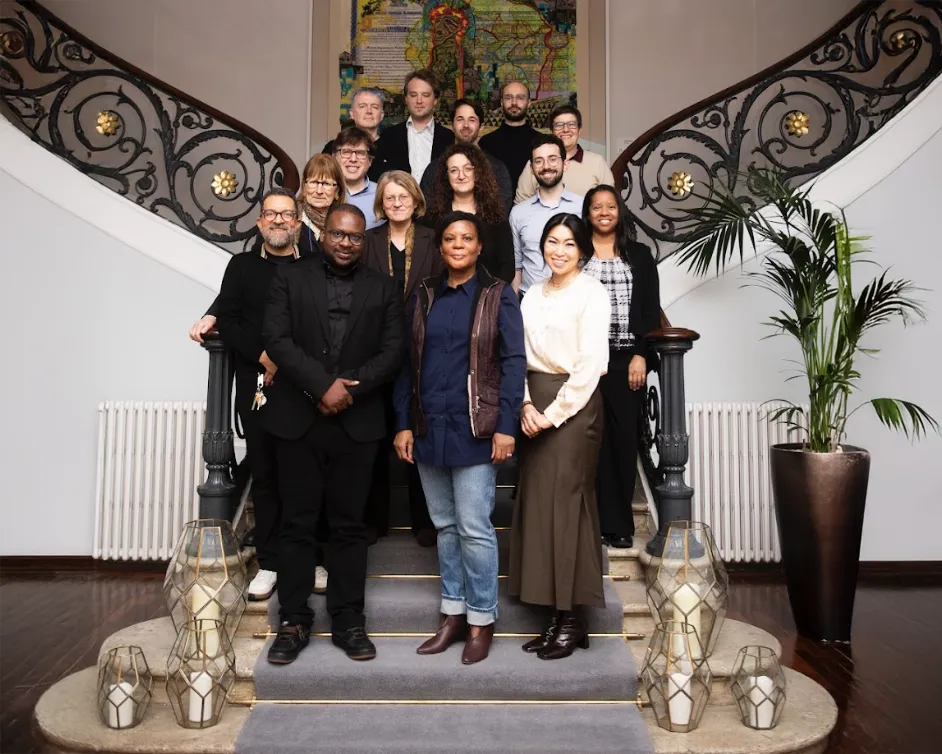
The Workshop
Much of the prior work of the ad-hoc AI Policy and Governance Working Group has been reactive to calls for expert comment; this convening was intended to be proactive; to turn these experts into policy innovators, leading conversations rather than reacting to the evolution of AI. This group of innovators, policy experts, researchers intend to develop a vision and articulate it in an legible and tangible fashion. The two-day workshop was uniquely structured around a world-building exercise using Design Fiction. Working group participants ideated on future scenario related to possibilities for AI agents.
Summary
Over two days in December, I facilitated a Design Fiction workshop to imagine futures with AI agents; the impact of this shift on society, and by implication, the need for innovative policy ideas. The AI Policy and Governance Working Group participants envisioned products such as AI-powered HR managers, automated community mediators, and AI agents addressing social issues such as addiction and healthcare. These scenarios highlighted both opportunities and risks, from increased efficiency to the potential loss of meaningful human interaction and ethical concerns about corporate control.
Written By: Julian Bleecker
Semantic Tags AIARTIFICIAL INTELLIGENCEDESIGN FICTIONGOVERNANCEPOLICY
ai-policy-and-governance-working-groupOver the years, I’ve been part of many conversations about the role of AI in society—often reactive, responding to calls for expert commentary or addressing the latest tech headline. The London convening was different. It was proactive, creative, and, in many ways, refreshingly speculative.
I had the privilege of facilitating this gathering, which was designed to imagine futures with AI agents, their societal impact, and the kinds of policies that could shape those futures. What set this session apart was its focus on world-building. We weren’t just discussing abstract possibilities; we were prototyping a future world using an approach called design fiction.
I also developed some stimulus artifacts, including this newspaper from an AI future.
In this workshop, we didn’t just talk about AI as a technical tool or a theoretical concern. We immersed ourselves in a creative exercise, building scenarios around AI-powered agents. The participants—a diverse group of thinkers, creators, and policymakers—crafted speculative futures where AI agents redefined human experiences.
We explored scenarios like:
-
AI in HR management: Systems that streamline hiring but raise questions about transparency and fairness.
-
Automated community mediators: Tools designed to resolve disputes efficiently but requiring careful consideration of equity and trust.
-
AI addressing social challenges: Agents tackling healthcare disparities or addiction, revealing both transformative potential and ethical concerns.
The goal wasn’t just to dream up new technologies but to understand the ripple effects—cultural, social, and ethical—that such systems might create.
What made this session so engaging was the move from ideation to prototyping. As the ideas emerged, we started brainstorming tangible artifacts of the future—objects, tools, or even speculative policies that could exist in these imagined worlds. These artifacts help ground the abstract in the tangible, sparking conversations that bridge the creative and the practical.
For me, this process highlights one of the most exciting aspects of design fiction: it’s not about predicting the future; it’s about creating a shared language to talk about the future we want—and the futures we might want to avoid.
The insights from this session are already shaping the next steps: We’re exploring ways to refine the artifacts and turn them into artifacts and tools for further dialogue. Whether they become speculative prototypes, guides for developers, or provocations for policymakers, the aim is to make the abstract more concrete.
Great time in London and a great group of participants that I could tell left quite energized by the discussions, activities, and concepts developed during the workshop.